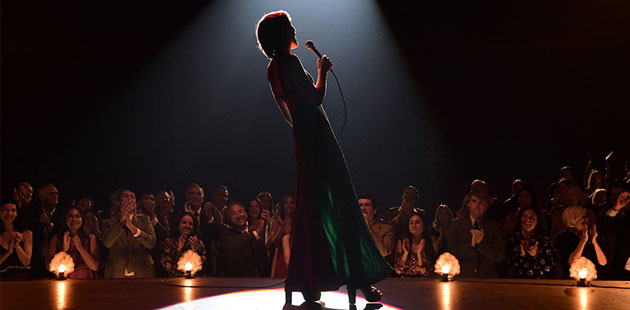 I Am Woman is the story of Australian singer, Helen Reddy, and her rise to fame in the early 1970s.
I Am Woman is the story of Australian singer, Helen Reddy, and her rise to fame in the early 1970s.
After arriving in New York in 1966 as a single mum on the false promise of a music contract, we watch Helen’s struggle to record music before finally breaking through. Her star eventually ascends in 1972 when her song, I Am Woman, became her first number 1.
We skim across the next few years of fame and more hits until her star begins to wane before the decade is out. The film then jumps to the end of the 1980s where Helen, living a smaller and quieter life, doubts whether her music had any value at all.
Biopics, like any work of adaptation, are difficult. The major difficulty here is that too often it takes the audience for granted, telling a preferred story rather than a truly dramatically engaging one. The best example of this possibly centres around the creation of the titular song.
Writer Emma Jensen and Director Unjoo Moon attempt to give the song, I Am Woman, near mythic importance, but we never see any of the recording of it (presumably because the film would then have to acknowledge the existence of Ray Burton, who co-wrote the song and who Helen later had a falling out with).
Instead, we leap from Helen scribbling down a few lyrics to playing the finished version for the studio, later exclaiming to her husband, “This song is important to me!” But, based on what? By all accounts Helen was not a prolific song writer, so the act of writing any song would have been significant for her, but the audience does not know that.
We need more than her character telling us it’s important (something also not helped by the montage of the song’s rise to the top of the charts, completely sidestepping the fact the single that went to number 1 was actually a re-recording she did a year later for her third album). Shortcuts with this kind of film are unavoidable, but sometimes those choices can be to the detriment of the storytelling.
Tilda Cobham-Hervey does lovely work as Helen, giving her scenes no shortage of feeling despite any deficiencies on the page. Helen’s best friend and rock journalist Lillian Roxon is played wonderfully by Danielle Macdonald and – despite consumption-like coughs that would be too-obvious foreshadowing in a costume drama – the scenes between Helen and Lillian are easily the best.
Evan Peters plays Jeff Wald, Helen’s (now ex) husband. Peters does his best, but his character mostly comes off as a function – changing to suit the needs for the scene (such as a ridiculously over-the-top violent breakfast scene which both comes out of nowhere and is never returned to).
Early in the film, Helen and Lillian find themselves seated in a small club listening to a beautiful folk song. It is a rare subtle point of influence for Helen, reinforced by the song’s refrain “I am…” This song, Revolution, is performed in the film by Helen Reddy’s real-life granddaughter Lily Donat, and although presented against a sparse acoustic guitar as if an artefact of its time still sounds utterly modern and spellbinding.
There is an incredible amount of bravery in the character of Helen Reddy in that opening shot from 1966 that is never really explored. What happens afterwards is mostly a kind of abbreviated biography, a stone skimming along the surface instead of risking a plunge into deeper narrative waters.
I Am Woman is available to view on STAN. For more information, visit: www.stan.com.au for details.
Image: Tilda Cobham-Hervey as Helen Reddy in I Am Woman – courtesy of STAN
Review: David Collins
